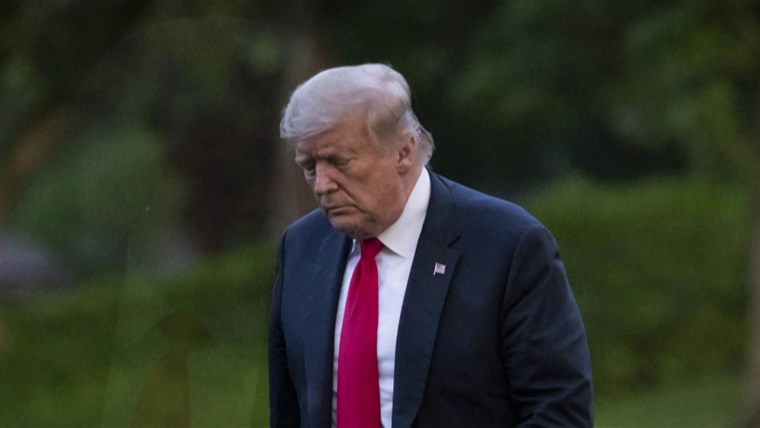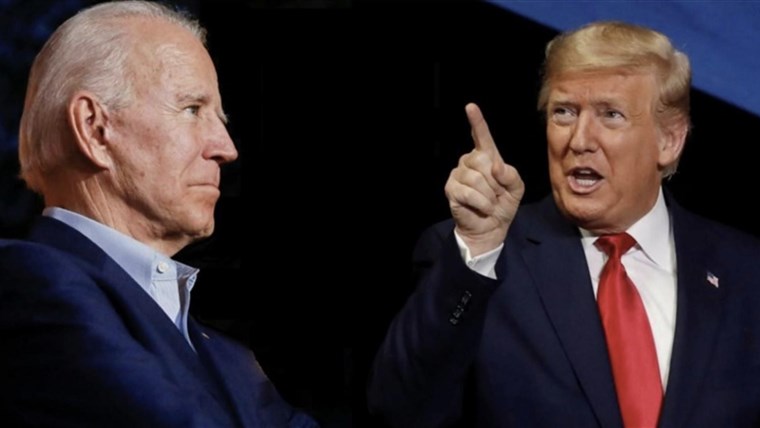Dennis Boyer, a former lawyer who retired years ago to his farm in southwestern Wisconsin, says there’s no question whom he and many people he’s talking to are voting for in November: It’s Joe Biden.
Boyer, a self-described independent voter who said he didn’t vote for Donald Trump or Hillary Clinton in 2016, said the coronavirus pandemic — despite not being as virulent in the state as in many others — has “really exposed problems that pretty much connect to everything,” to the point that “voters of all stripes here really have a reason to oppose Donald Trump.”
“It’s a convergence of all the big issues of our time: health care, race, inequality. Even basic decency and human dignity. I think it’s really activating a lot of people here and certainly activating a lot of people who weren’t terribly active here in 2016,” said Boyer, who does remote part-time work with a nonpartisan nonprofit that promotes civic engagement through conversation.
“Almost any way you cut it, it’s hard to defend the president,” he said.
Although the general election is still months away, interviews with a number of Wisconsin voters, current and former lawmakers, party officials, political strategists, pollsters, politics watchers and union officials paint a picture of a critical battleground slipping from the president’s grasp. Despite middle-of-the-pack COVID-19 infection, death rate and unemployment numbers, the sources said there are warning signs for Trump’s re-election campaign in nearly all corners of the state, which he turned red for the first time since 1984.
And while enthusiasm for Biden isn’t exactly robust, his campaign’s increased investment in and attention to Wisconsin — as well as a litany of unforced errors by Trump and the subsequent lagging poll numbers his campaign is seeing — are enough to concern even the state’s most prominent Republican.
“It’s tough for him any time, and every time, really, he’s not talking about issues related to the economy or to safety or to public health,” former Gov. Scott Walker said in an interview when asked whether Trump’s handling of the pandemic and recent remarks like his stated desire to “slow down” testing for the virus were jeopardizing his chances of winning again in Wisconsin.
“This is going to be a referendum on the president, and it’s going to be a referendum based on the three things that people are worried about right now: their health, the health of the economy and how safe things are in the state,” Walker said. “They’ve got to really continue addressing those three issues.”
Wisconsin hasn’t been as affected by the outbreak as other states — its COVID-19 case total, death count, per capita infection rate and per capita death rate, as well as its percentage of the state’s workforce who have filed first-time claims for unemployment benefits since March 14, are all better than those of at least half the states, although Wisconsin has recorded a modest rise in COVID-19 cases in the last two weeks.
But its residents are still very much feeling the pain of the pandemic, and recent polling appears to indicate that many feel Trump is to blame.
Biden led Trump among registered Wisconsin voters by 49 percent to 41 percent, according to a Marquette Law School Poll — the gold standard of polling in the state — released last week. (The latest RealClearPolitics average of recent polling also indicated an upward battle for Trump, showing that he would lose Wisconsin to Biden in a head-to-head matchup, 48.5 percent to 42 percent.)
The Marquette poll, however, also showed that Trump’s overall job approval declined from the previous month’s poll, to 45 percent (with 51 percent saying they disapprove), while approval of his handling of the coronavirus pandemic fell to 44 percent (with 52 percent saying they disapprove).
Critically, the poll also found that support for Trump fell among Republicans, while support for Biden rose among independent voters.
“Certainly, the consensus of public opinion in Wisconsin is that the president has done more to hurt himself than he has to help himself,” said the poll’s director, Charles Franklin, a political science professor at Marquette University.
Charlie Sykes, a former conservative talk radio host in Wisconsin who opposes Trump, said, “Wisconsin voters are paying attention to his lack of empathy and his failure to responsibly deal with the crisis.
“Independents are walking away from Trump. That’s a big deal,” added Sykes, an MSNBC contributor who founded the conservative news site The Bulwark.
In many respects, repeating Trump’s surprise, narrow 2016 victory in Wisconsin — he won by just under 23,000 votes — was always going to be an onerous task. And races that have occurred in the state since then suggest that even before the pandemic, Trump was facing a Democratic base far more motivated than it was in 2016.
In 2018, the nationwide “blue wave” of Democratic victories carried particular weight in Wisconsin, where Democrat Tony Evers defeated Walker (who had, since 2011, won two general elections and a recall election) and Democratic Sen. Tammy Baldwin comfortably won re-election over Leah Vukmir, whom Trump endorsed.
Even more troubling for Republicans were the results from the high-stakes state Supreme Court election in April. Liberal judge Jill Karofsky defeated conservative Justice Daniel Kelly, who was also backed by Trump, in an election that took place despite the pandemic, with voters donning masks and gloves and braving long lines to cast ballots.
“When you look at whether real, strong Democratic enthusiasm exists here, well, you saw that in the 2018 election and in the spring Supreme Court election,” Sykes said. “That is what anti-Trump sentiment looks like.
“And obviously, it’s compounded by the broad uncertainty created by his pandemic response. All of that is what’s driving the dynamic in the state right now,” he said.
However, it was Baldwin’s 2018 win — she took home the highest percentage of any candidate for governor or senator in the state in 12 years — that could present the best blueprint for a Biden win, strategists and Democratic lawmakers said.
Baldwin, one of the most liberal members of Congress, carried 17 counties that Trump had carried two years earlier — including rural, working-class areas along the border with Minnesota, working-class counties around Green Bay and some suburban counties south of Milwaukee and around Madison. Notably, she won nearly 40 percent of the vote in Waukesha County, the Republican stronghold that comprises the western suburbs of Milwaukee, and 42 percent of the vote in Ozaukee County, north of Milwaukee — levels no Democratic presidential nominee has reached in more than 20 years.
So Democrats in the state took it as a promising sign last week when Biden announced a Wisconsin team led by two veterans of Baldwin’s 2018 campaign.
“This is a huge improvement from four years ago as it pertains to the level of seriousness the party is showing in carrying Wisconsin,” said Democratic U.S. Rep. Ron Kind, whose western Wisconsin district comprises several counties that Trump flipped red in 2016.
State Rep. Robyn Vining, a Democrat who flipped a conservative state Assembly district that includes part of Waukesha County in 2018, said: “The Baldwin hires were incredibly smart. They’ll help Joe Biden follow a solid road map to victory in this state.”
Asked about its other investments in Wisconsin, the Biden campaign pointed to three virtual events geared specifically to the state featuring Joe or Jill Biden since May 20, as well as eight more since May 8 that featured campaign surrogates. The campaign declined to say how many voters it had reached virtually since the campaign went fully digital on March 14, but it did say that at a recent “virtual weekend of action” hosted by the state Democratic Party, “thousands” of volunteers made “hundreds of thousands of phone calls.”
Democrats in the state also said the Democratic National Convention, which will be held in Milwaukee next month as a mostly virtual, scaled-down event because of the pandemic, could be a valuable tool to help mobilize voters and volunteers.
Download the NBC News app for breaking news and politics
Trump Victory, the joint operation between the Trump re-election campaign and the Republican National Committee, said that during the time the campaign was digital-only, it made 4.2 million online voter contacts in Wisconsin and held 180 virtual training sessions with more than 600 volunteers. The campaign said it resumed in-person voter contacts June 8.
In addition, Trump and Vice President Mike Pence both visited the state last week — the president, as part of an official administration trip, toured a shipyard outside Green Bay, while the vice president, as part of a campaign visit, trekked through the Milwaukee suburbs. Republicans said the trips proved Trump will prioritize the state, while Democrats said the travel proved the campaign is feeling vulnerable.
“I think once people in Wisconsin figure out the real Joe Biden and once we refresh voters’ memories here of all the things Trump has done and can do again for the economy that Wisconsinites will go for Trump,” said Republican U.S. Rep. Glenn Grothman, who represents a solidly Republican district between Milwaukee and Madison that Trump easily carried in 2016. “He can turn it around.”
Republicans and Democrats also said that whether Biden’s virtual events are breaking through remains an open, and significant, question. But at the moment, it’s a question that may not matter much, with public opinion in the state tilted firmly against Trump.
“People’s minds here are more or less made up about Donald Trump,” said Joe Zepecki, a Milwaukee-based Democratic strategist. “But people here want to know more about Joe Biden.
“Trump has been doing nothing but hurting himself, and that just makes Biden’s job — running against an incumbent president, typically a very tall order — a little less difficult.”



